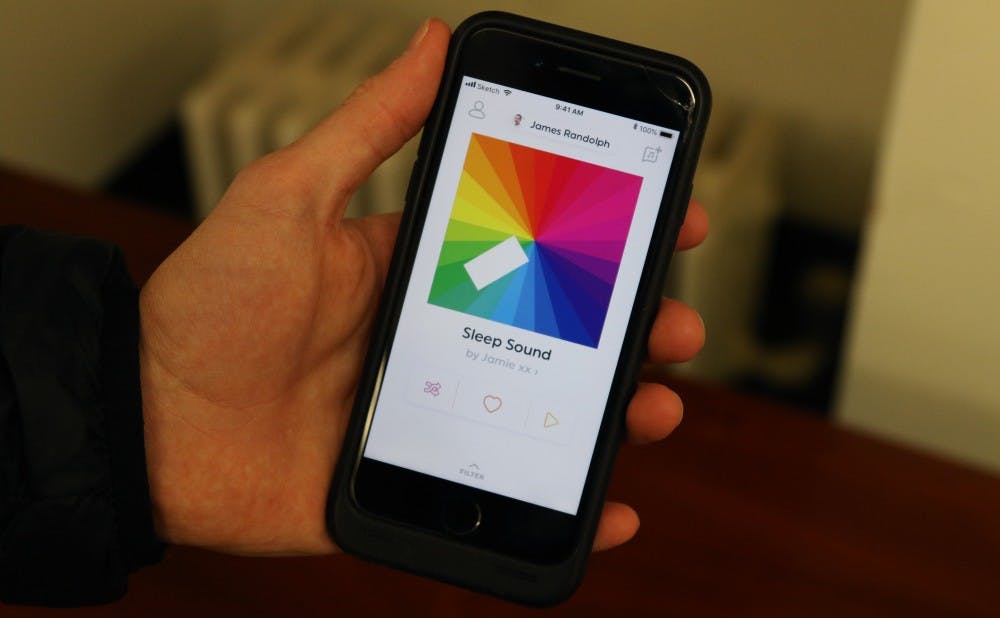If you use a music streaming service like Spotify, then chances are you have come across mixes tailored to your listening habits — whether it’s “New Music Friday,” “Discover Weekly” or “Tastebreakers.” For many listeners, these algorithmically-generated playlists are one of the only options for discovering new music.
But to sophomore Ben Snow, something was missing.
He felt that the social element of sharing music had been overlooked by platforms like Spotify and Apple Music. Inspired by the universal experience of passing the aux cord while driving with friends, he sought to design an app that replicated that sense of connection through music.
“I recognized that music discovery could be better,” Snow said, pointing out that many Spotify users do not even use its built-in discovery tools. “When I started talking to people and getting out there, everyone started telling me the same thing: that 90 to 95 percent of the time, they just go on Spotify for the music library. And I realized, that’s a fundamental flaw. Because there’s something magical about music discovery.”
Snow’s idea came to life as Vibe, a social media music discovery app that he hopes to launch exclusively at Duke in April. Beginning with an investment from the Duke Innovation & Entrepreneurship program and the assistance of a Duke graduate coder, Snow has developed a beta version of the app that is nearing full functionality. As Vibe’s co-founder and CEO — along with co-founder and CFO Gaurav Sharma, a sophomore — Snow has recruited a team of 17 campus ambassadors, including teams for graphic design, social media and operations, to help spread the word about Vibe.
Together, Snow and Sharma have spent the last six months building the app and increasing its functionality. With LDOC and finals season approaching, the founders hope that the app will see an audience at Duke in time for the end of the semester — whether to help students celebrate the end of classes or to help them unwind after long study sessions.
What sets Vibe apart from more traditional streaming services, Snow said, is its emphasis on interactivity and connection between users. At the center of the app’s interface is a feature called the “lineup”: When a user registers an account, the app scans their Spotify or Apple Music profiles for their most frequently-played artists of the last six months, saving up to 20 artists on the user’s Vibe profile. With the lineup — which is publicly viewable by any user — other users can choose to shuffle through their friends’ libraries, in essence creating their own online radio station based on selected friends’ music tastes.
“You have a customized, independent and individualized experience every time you go on the app — based on your friends, rather than ‘New Music Friday’ or random mood-curated discovery playlists,” Snow said.
While shuffling through friends’ lineups, a user may choose to “like” any given song, which both adds the song to the user’s own music library (on their streaming service of choice) and updates the friend’s “score,” a tally of likes that displays publicly on their profile. Far from creating a socially competitive environment, though, Snow said these features aim to restore the emotional rush that comes with sharing music — an aspect he felt was lacking in most streaming services or, for that matter, through sharing links over text.
Particularly in a college environment, too, Snow noted that Vibe has the potential to provide connection between students through a medium, listening to music, that often occurs in isolation. He noted the frequent use of music as a distraction while studying.
“It’s a tool that, personally, I think, could make kids a lot happier,” Snow said. “You think about how people listen to music all the time, most people are listening to it to escape — let’s say studies get too overwhelming, you cloud it all out. And I think that the experience that we’re getting right now is just inferior. … [Vibe] is just a great platform to use to relax, to connect more with your friends and to just have a more fun experience in general.”
In addition to its social potential, Snow and Sharma pointed out that Vibe directly challenges the increasingly algorithm-centered landscape of music streaming, where landing on coveted “curated” mixes can make or break an artist’s burgeoning career. By creating an experience that prioritizes the organic sharing of music between friends Vibe decentralizes this trend in the music industry. In the process, it improves the experience of artists and listeners alike, Snow said. Although the app does not exist independent of giant streaming companies like Spotify and Apple, it at least hopes to bring out the best in them.
“We’ve always relied on our friends for recommendations, to point us in new directions, to new genres,” Snow said.
With Vibe, that timeless experience is simply taking on a new look.
Correction: A previous version of the article incorrectly listed Sharma's title as chief ambassador. The article has been updated to reflect his correct title. The Chronicle regrets the error.
Get The Chronicle straight to your inbox
Sign up for our weekly newsletter. Cancel at any time.

